Chief Albert Luthuli Research Chair
Reliving Luthuli: Reflecting on the past to reimagine the future
Delivering the welcoming address at Unisa’s 5th Chief Albert Luthuli Research Chair Founders Lecture held on 17 November 2023, Prof Puleng LenkaBula, Unisa’s Principal and Vice-Chancellor (VC), affirmed that as the university celebrates its 150th anniversary this year, it is unapologetic about uplifting and honouring African liberation icons such as Chief Luthuli, whose work is sometimes muted to be erased from the memories of the African people. Themed "Pan-Africanism: revisiting (looking back) and reimagining (looking forward)", Luthuli was remembered as a proponent of pan-Africanism who fought against racism, imperialism and white domination.
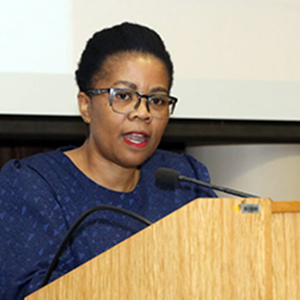
Prof Puleng LenkaBula
LenkaBula remarked: "Such icons contributed to the history that led to our democracy, but sometimes we forget the violence, dehumanisation and oppression they suffered, which was caused by colonialism and apartheid that still feature in our lives." Additionally, the VC called on higher learning institutions to produce pan-African curricula and research that inform policy systems, economic transformation, and political systems continentally and globally that promote African philosophies and science and do not dehumanise Africans.
Prof Thenjiwe Meyiwa, Unisa’s Vice-Principal of Research, Postgraduate Studies, Innovation and Commercialisation, said Luthuli was not just a leader but a visionary, principled and a champion of justice. She asserted: "He was also a prominent figure in the struggle against apartheid, and he led the African National Congress during a critical time of history in South Africa." For Meyiwa, Luthuli’s commitment to non-violent resistance and his unwavering belief in the power of dialogue set him apart as the beacon of hope in the fight against racial discrimination. She continued: "The establishment of Unisa’s Chief Albert Luthuli Research Chair is a testament to the institution’s dedication to preserving and advancing the values that Chief Luthuli stood for."
Unisa’s incumbent of the Chief Albert Luthuli Research Chair, Prof Puleng Segalo, stated that for Luthuli’s work to be centred in public spaces such as the libraries, there was a need to reclaim, recentre and acknowledge his contribution to the African liberation struggle. Segalo added that through its work, the Chief Albert Luthuli Research Chair hoped that Africa would overcome the effects of colonialism and that it had the potential to debunk the "hopeless continent" stereotype and fuel its development.
"To begin the process of decolonising our minds," she continued, "we must first examine how we were affected by colonisation, be strategic in our efforts to increase the African history’s visibility, the acceptance of our indigenous knowledge systems, and the appreciation of our African cultures." Segalo said the excavation of history, including the distorted African history, is one of the strategic objectives of the Chief Albert Luthuli Research Chair, and it deliberates on embarking on projects that attend to the revisiting and retelling of African stories.
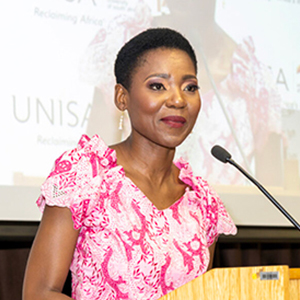
Prof Puleng Segalo |
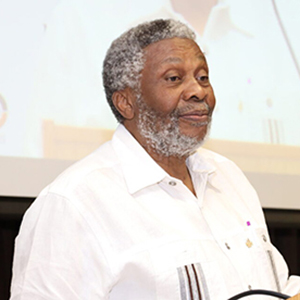
Prof Horace G Campbell |
Horace G Campbell, a renowned international peace and justice scholar and a Professor of African American Studies and Political Science at the Syracuse University’s Maxwell School in New York, delivered a thought-provoking keynote address. Campbell said: "The pan-African movement arose as a philosophy to restore the humanity and dignity of African people and all other human beings." He attested that the pan-African songs of freedom echoed through the ages of struggles, with every transformation of global capitalism unleashing new forms of struggle.
Additionally, Campbell noted: "Pan-African freedom and reparative justice are two fundamental aspects of pan-Africanism from the genocide and war capitalism era to the current era of wars against human beings and nature." He added: "The challenges to the future of humanity vividly represented by the existential crises of global warming, pandemics, and artificial intelligence remind us that these are the gifts of global capital." Campbell argued that the lecture was not just a reminder of the objectives of pan-African freedom and emancipation but also underlined that when Luthuli spoke, there was an explicit pan-African rendition of the concept of freedom.
Campbell further said that the African youth is demanding politics and economic relations that do not promote whiteness. "They are searching for the reconstruction and revitalisation of Africa," he argued. Campbell emphasised that Luthuli did not belong to the church of hatred, discrimination and injustice but to that of non-violence, revolution, and pan-Africanism that promoted morality and harmony. He said: "It is incumbent on us in the peace movement to not label freedom fighters as terrorists. We must elevate the ideas and practices of pan-African solidarity beyond the African union."
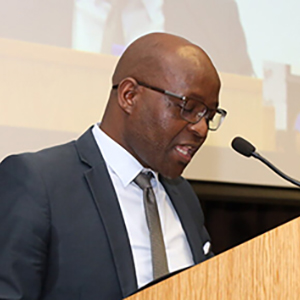
Prof Mxolisi Mchunu
Responding to the lecture, Dr Lehasa Moloi, Unisa’s Senior Lecturer at the Department of Development Studies, proposed: "To attain the reclamation of Africa’s intellectual future means we should not just be decolonial without being Afrocentric in our approach to the decolonial meditation through our identity." He continued that being Afrocentric included approaching the decolonial debate from a perspective of Afrocentric history and culture, enabling an Afrocentric knowledge production. In addition, Dr Dikeledi Mokoena, Lecturer at the University of Johannesburg’s Department of Anthropology and Development Studies, said: "The ideologies of epistemic justice and epistemic repatriation should also be considered in the context of epistemic hegemony of the West that persists in the lives of Africans and through moments of crises such as the COVID-19 pandemic." She also remarked that whichever pan-African version dominates, Africans must be mindful of its consequences and rethink the African Union’s direction of the pan-African version.
The respondents and keynote speaker addressed questions about how Africans can begin the process of mental decolonisation and abolishing the concept of whiteness, how institutions of higher learning can narrate the lives of Africans, and how Africans can realise that education is not a tool for wealth but for empowerment.
Delivering the vote of thanks, Prof Mxolisi Mchunu, Deputy Chairperson of the Luthuli Museum Council, said he appreciated that Campbell called on Africans to rekindle and reaffirm their commitment to a better, peaceful, prosperous Africa. Emphasising that much should still be done, he concluded: "Let the spirit of Chief Luthuli continue to live in us."
Click here to watch a video recording of the 5th Chief Albert Luthuli Research Chair Lecture.
#Unisa150
* By Nancy Legodi, Acting Senior Journalist, Department of Institutional Advancement
** Images by Unisa Multimedia Office
Publish date: 2023-11-21 00:00:00.0

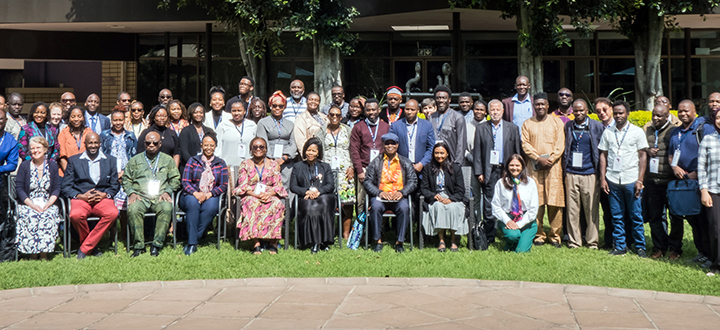 Social policy in post-Covid Africa: In search of an inclusive and equitable architecture
Social policy in post-Covid Africa: In search of an inclusive and equitable architecture
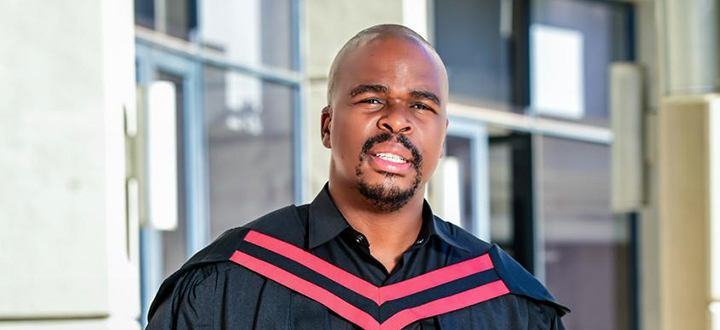 Education in pursuit of social justice
Education in pursuit of social justice
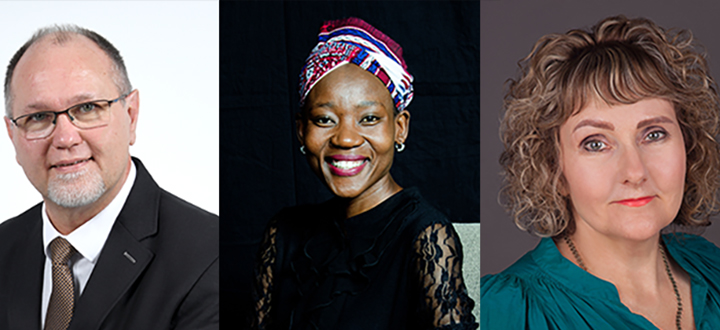 Unisa shows that developing countries are equal partners in research management and administration capacity development
Unisa shows that developing countries are equal partners in research management and administration capacity development
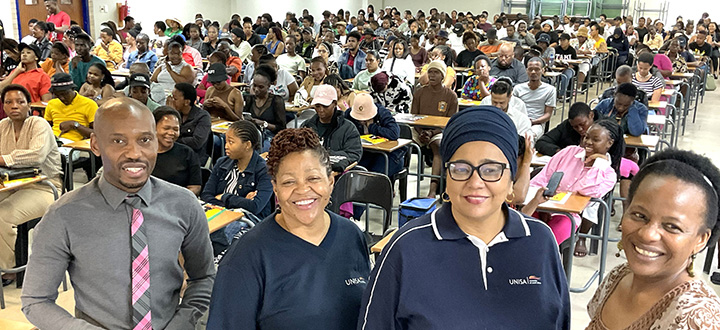 Unisa KZN Career Fair bridges the gap between students and employers
Unisa KZN Career Fair bridges the gap between students and employers
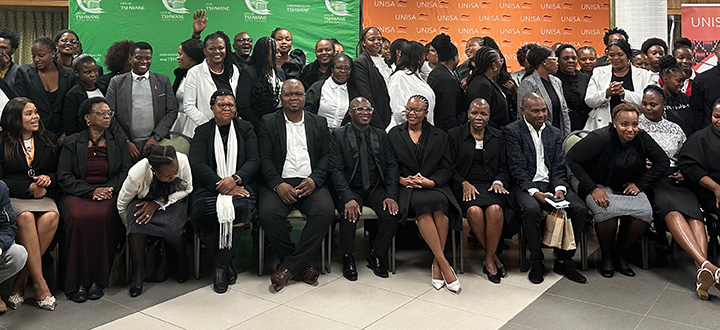 Unisa academics join hands to celebrate World Social Work Day
Unisa academics join hands to celebrate World Social Work Day